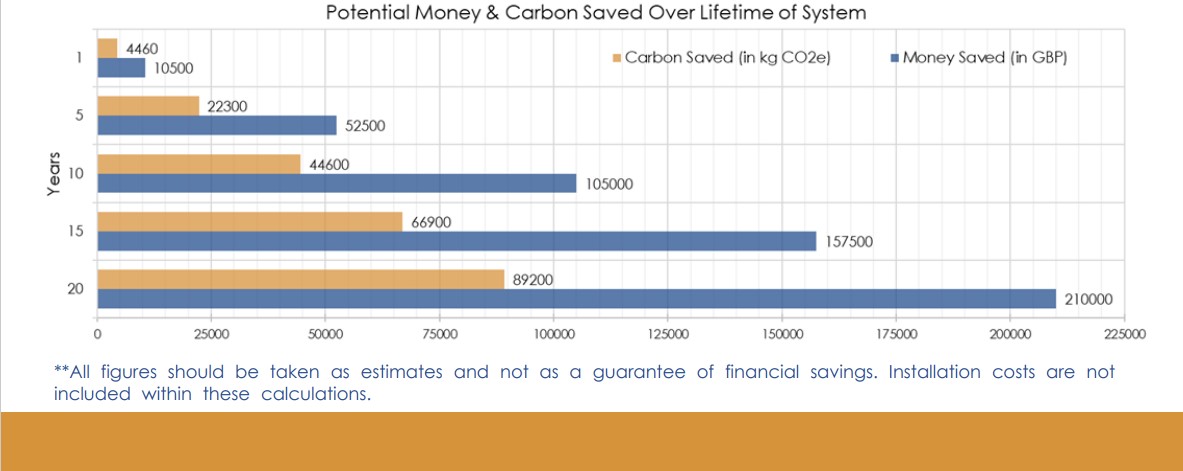Our Carbon Saving Calculator shows the continuous carbon saving using renewable energy. This saving is created by the systems we have installed over the last fifteen years.
At Nicholls Boreholes and Ground Source we actively promote and encourage sustainability with regards to reducing carbon emissions and installing renewable energy systems with longevity. This ethos spreads through the wider business, including our sister company Nicholls Countryside Construction Ltd. We encourage the recycling of all materials where possible.
Our rural premises are carbon neutral – this has been achieved with the installation of solar panels, a wind turbine and a Ground Source Heat Pump system providing all the energy, heating and hot water for our offices. Additionally, we have installed a water borehole at our site to help reduce our impact on the mains water supply and save costs.
Nicholls Boreholes promote Ground Source Heat Pump and Water Source Heat Pump systems as they can be some of the most efficient carbon saving solutions.
Did you know that installing a water borehole at your premises to reduce your water consumption by 20³ per day from the mains supply can reduce your carbon footprint on water usage by up to 80%? (Carbon Study undertaken by Nicholls Boreholes 2021).
Did you know that installing a Ground Source Heat Pump system can produce approximately 4kW of heat for every 1kW of electricity used to run the system COP (Co-efficiency Of Performance). Open Loop Heat Pump Systems can be significantly more efficient.
If you’d like to discuss any of the above further, please do not hesitate to contact us.
21% of all UK carbon emissions are from energy supply [1]. This is a hugely important area of focus for the UK’s transition to net-zero, and with plans to phase out new gas boilers by the mid-2030s, getting a heat pump installed is getting ahead of the curve.
For the average GSHP system installed by Nicholls in 2020, 6.3 tonnes of carbon is saved in the first year alone. After 20 years this rises to a massive 155.5 tonnes – a 75% reduction in greenhouse gas emissions that equates to removing 75 cars from the road for a year [2].
Our carbon calculator works out how much you could save based on your property’s annual heating demand and your current boiler system. Please contact enquires@nichollsboreholes.co.uk for more information.
We have also developed a comprehensive calculator to document the estimated savings from all of the heat pumps worked on by Nicholls. From 2008–2020, an estimated 12,099 tonnes of carbon has been saved after factoring in drilling fuel – a reduction in emissions that would displace 5,828 cars. [3]
We will continue to update our calculations each year. With the electric grid decarbonising rapidly, your future emissions savings are likely to be far higher than our estimates. You could also significantly improve your savings by switching to a green electricity tariff.
[1] BEIS ‘Transport and Environment Statistics: 2021 annual report’: Transport and Environment Statistics: 2021 Annual Report (publishing.service.gov.uk)
[2] Gas, oil, and LPG boiler switch average figure used. Carbon intensity of all fuels is based on gov.uk conversion factors 2021. A downgraded average heat pump efficiency of 350% is used; many new systems will achieve much higher levels. ‘Average car’ emissions taken from gov.uk conversion factors 2020. A 2019 average annual mileage of 7400 is used to reflect pre-Covid levels: Vehicle mileage and occupancy – GOV.UK (www.gov.uk)
[3] Gas, oil, and LPG boiler switch average figure used. Carbon intensity of the electric grid is lifted yearly for each install from 2008 – 2000 for a more accurate overall saving. All figures use Carbon dioxide ‘equivalence’, which factors-in the greenhouse gas potential of more potent substances such as nitrous oxide and methane.
Gov.uk conversion factors 2021: Greenhouse gas reporting: conversion factors 2021 – GOV.UK (www.gov.uk)
2008 – 2020 conversion factors are also all available online.
Based on an average daily consumption of 20m3 per day, a saving of approximately £11,000 p.a. could be made through installation of a water borehole system. This figure assumes the cost of electricity at £0.40/kWh and comparison of water purchased from a mains water supplier at £1.80/m³.
At Nicholls Boreholes, we recommend that a water borehole system is serviced annually. Nicholls Boreholes can also provide an annual servicing & maintenance program.
Water boreholes have a lower environmental impact when compared to mains water. Through the installation of a water borehole, the client can reduce their emissions by 4,460kg CO2e p.a. Over a 20 year period this can offset the equivalent of a car driving approximately 433,000 miles (21,650 miles per year).
(Study by Nicholls Boreholes, 2021)

Our qualified, in house design team are able to assess your needs, design your project and undertake all your technical calculations and drawings.
Our teams of experienced, professional, qualified engineers provide a high standard of installation.
Our dedicated, in house service department can support your system for the long term.